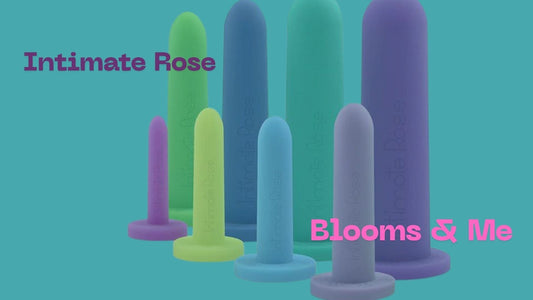Types of Vaginal Dilators | Intimate Rose vs Vagiwell
Vaginal dilators are medical devices that are used in progressively increasing sizes to gradually reduce discomfort during vaginal penetration and relieve painful sex. Although various types of vaginal dilators are sold by several different brands, all dilators are not the same. In this article, we’ve outlined the similarities and differences between Vagiwell silicone dilators and Intimate Rose silicone dilators to help you choose which one is right for you.
What Do Vaginal Dilators Do?
Due to their tubular shape of varying widths and lengths, dilators are designed to treat vaginal tightness during penetration (vaginismus) and painful sex (dyspareunia) that are often linked to pelvic & sexual trauma, vaginal injuries, or vaginal dryness. By gently and gradually stretching the vaginal tissues and pelvic floor muscles, blood flow is increased in the genital area, and natural lubrication is improved, thereby relieving tightness, dryness, discomfort, and pain.
That said, vaginal dilators are not just about enjoying pain-free sex, they also offer healing support after pelvic or vaginal surgery & treatments. For example, after pelvic surgery, a hysterectomy, radiation treatment for cervical cancer, and transgender surgery, using vaginal dilators can prevent scar tissue from forming and improve muscle elasticity during recovery.
Conditions that Benefit from Vaginal Dilator Therapy
Vaginal dilator therapy, aka the regular use of vaginal dilators at home as per the advice of your health practitioner, is helpful in the treatment of several conditions. These include:
- Chronic pelvic floor pain
- Endometriosis
- Dyspareunia due to hormonal fluctuations during pregnancy, breastfeeding, or menopause
- Interstitial cystitis
- Lichen Sclerosis
- Vaginal Atrophy
- Vaginal Stenosis
- Vaginismus
- Vaginitis
- Vulvodynia
What Types of Vaginal Dilators Are There?
There are several types of vaginal dilators made by numerous different brands, the majority of which are made from either plastic or silicone. These days, most women find the flexible and life-like feel of silicone dilators more comfortable, but some still prefer the rigid firmness of plastic dilators.
This is mainly because medical-grade silicone feels softer against the delicate vaginal skin and any scar tissue that develops after surgery. Additionally, because silicone is smooth compared to the grooves or indentations sometimes present on the surface of plastic dilators, silicone is considered easier to clean, meaning the growth of unwanted bacteria is also prevented.
Another difference between plastic and silicone dilators is that silicone is easier to hold when lubricated for insertion, whereas plastic dilators are known to become slippery once lubricated.
Some brands also offer vibrating dilators, however, most female health practitioners advise that these are more suited to sexual arousal than pain management associated with dyspareunia, vaginismus, vaginitis, or surgery recovery.
One of the main factors to look for when choosing the right dilators is the number of dilators included in a set. Ideally, vaginal dilators should be bought in a set of incrementally ascending widths and lengths to stretch the vagina and pelvic floor muscles in a steady and gradual manner. That said, some brands sell a smaller variety of sizes than others per set, which admittedly costs less initially, but can often result in too large of a size difference when graduating from a smaller dilator to the next size in the set. In other words, it’s not worth cutting corners when it comes to healing.
The majority of dilator users also report that color differentiation - i.e. each dilator in a set has a different color – is helpful to choose the current size being used as opposed to remembering the correct size from a set of the same colors.
At the end of the day, however, although comparisons between different types of dilators are useful for research, it is always best to consult with your doctor, physical therapist, or health practitioner before purchasing to ensure that the dilator set is the right type for you.
Vagiwell Dilators vs Intimate Rose Dilators
Both Vagiwell and Intimate Rose Silicone Dilators are made from medical-grade silicone, they are both shipped using discreet shipping and the two brands also offer sets of progressively increasing sizes in various colors. However, there are also some differences between both products, including that Vagiwell does not export outside of the UK, whereas Intimate Rose ships globally.
According to research and customer feedback, the four most important factors to consider when purchasing vaginal dilators are size, material, comfort, and price. Below, we’ve outlined each category in relation to Vagiwell dilators and Intimate Rose dilators.
Size
Although both brands sell dilator sets in a variety of sizes, they vary slightly in that a full set of dilators from Vagiwell includes only 5 sizes and a set of Intimate Rose dilators includes 8 sizes. Measurement-wise, they also differ. Intimate Rose dilators start at 0.45 inches in diameter and progressively increase to a diameter of 1.5 inches, whereas Vagiwell dilators measure 0.47 inches in diameter to 1.18 inches.
Although the size variance may seem minimal, the three extra sizes of dilators in the set from Intimate Rose can make all the difference when it comes to the gentle and gradual healing required for such a sensitive part of the female body.
Another factor to consider when it comes to dilator sizes is that Intimate Rose offers the opportunity of purchasing each dilator individually for those with budget issues. In contrast, Vagiwell offers a full set of 5 dilators, a smaller set of 3 dilators, and only the largest dilator as a separate purchase.
Material
When it comes to material, Vagiwell dilators and Intimate Rose dilators are both made from medical-grade silicone that is considered flexible and comfortable by customers. the matte finish on dilators from Intimate Rose is often described by customers as silky smooth, and less sticky than other silicone dilators. It is important to choose a dilator that doesn’t have a sticky finish especially if you have undergone surgery or radiation, as that finish can be painful during use.
A notable difference concerning the material used, however, is product certification. While Intimate Rose dilators are designed by a pelvic health physical therapist, registered and compliant with the FDA, and used by the Academy of Pelvic Health training courses, Vagiwell is referred to as “an ethical company that will be certified soon”.
This is not to say that Vagiwell products are not approvable or certifiable, only that they do not appear to be certified yet.
Comfort
When it comes to comfort, both Vagiwell and Intimate Rose dilators receive positive customer reviews that include the words soft, comfortable, effective, and easy to use. However, a bonus from Intimate Rose dilators appears to be that the matte finish is even softer against sensitive vaginal skin.
Price
At Intimate Rose, a set of 8 dilators in progressively increasing sizes is sold for $179.99 with individual dilators ranging in price from $16.99 for the smallest to $44.99 for the largest.
At Vagiwell, a set of 5 dilators in progressively increasing sizes is sold for $111.99 (£89.85), with a set of 3 priced at $74.50 (£59.85), and the largest dilator is sold separately for $49.50 (£39.85).
Conclusion
Also referred to as vaginal trainers, vaginal dilators are tube-shaped medical devices that are designed to gently stretch tight vaginal or pelvic floor muscles. Particularly useful for reducing anxiety or discomfort surrounding vaginal penetration or pain during sex, vaginal dilators also help treat a variety of other conditions linked to the female genitals and pelvic floor.
Although numerous brands of dilators exist in today’s market, they are not all created equal and some research is beneficial to understand the differences before purchasing. In this article, we discussed the differences between Vagiwell silicone dilators and Intimate Rose silicone dilators.
References
Very Well Health – Vaginal Dilators: What You Need to Know - https://www.verywellhealth.com/vaginal-dilators-5220401
Mayo Clinic – Dysapeurnia - https://www.mayoclinic.org/diseases-conditions/painful-intercourse/symptoms-causes/syc-20375967
Cleveland Clinic – Vaginismus - https://my.clevelandclinic.org/health/diseases/15723-vaginismus
Medicine Journal & Research Articles - Vaginal dilator use to promote sexual wellbeing after radiotherapy in gynecological cancer survivors- https://journals.lww.com/md-journal/Fulltext/2022/01280/Vaginal_dilator_use_to_promote_sexual_wellbeing.46.aspx


